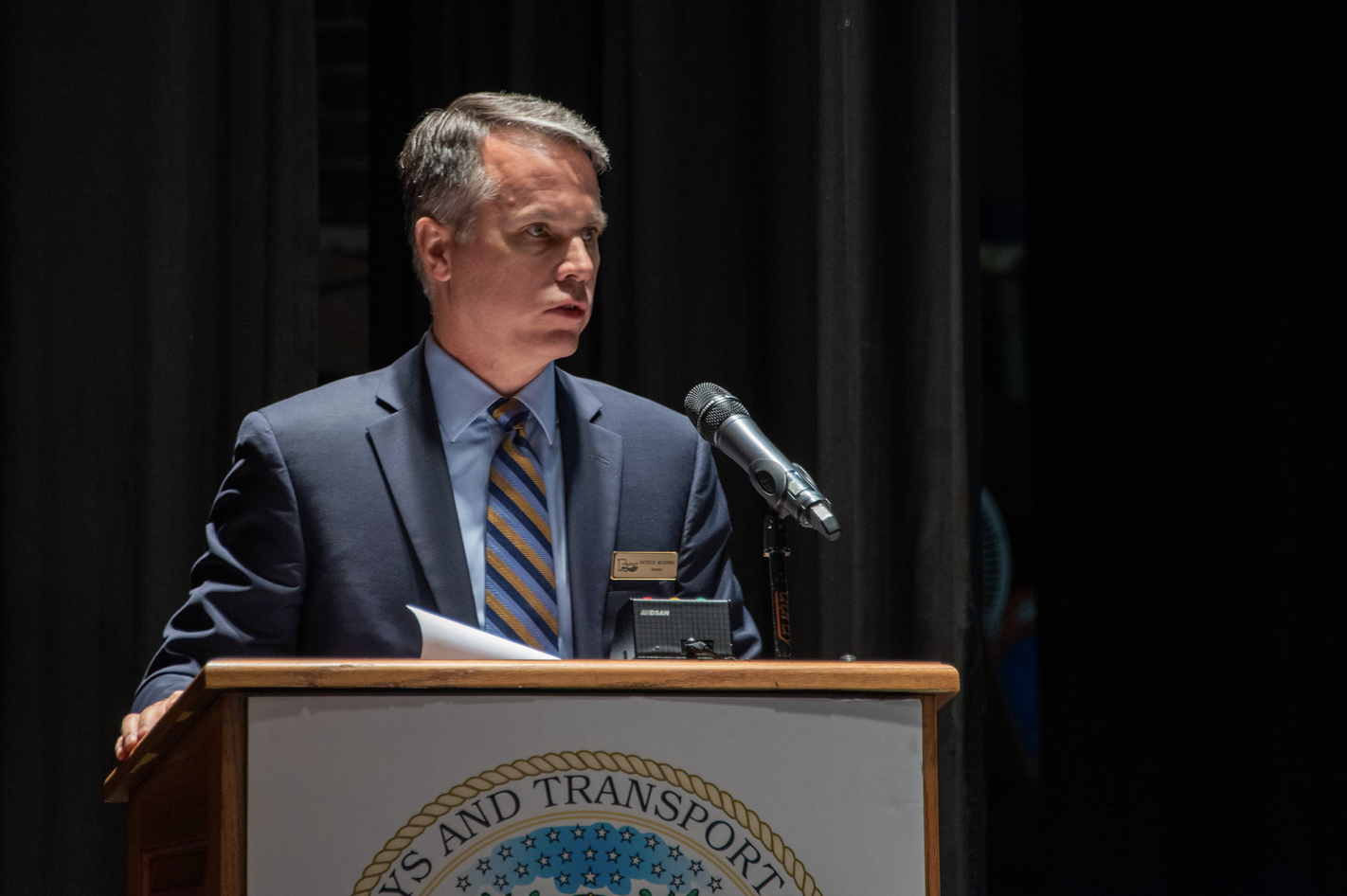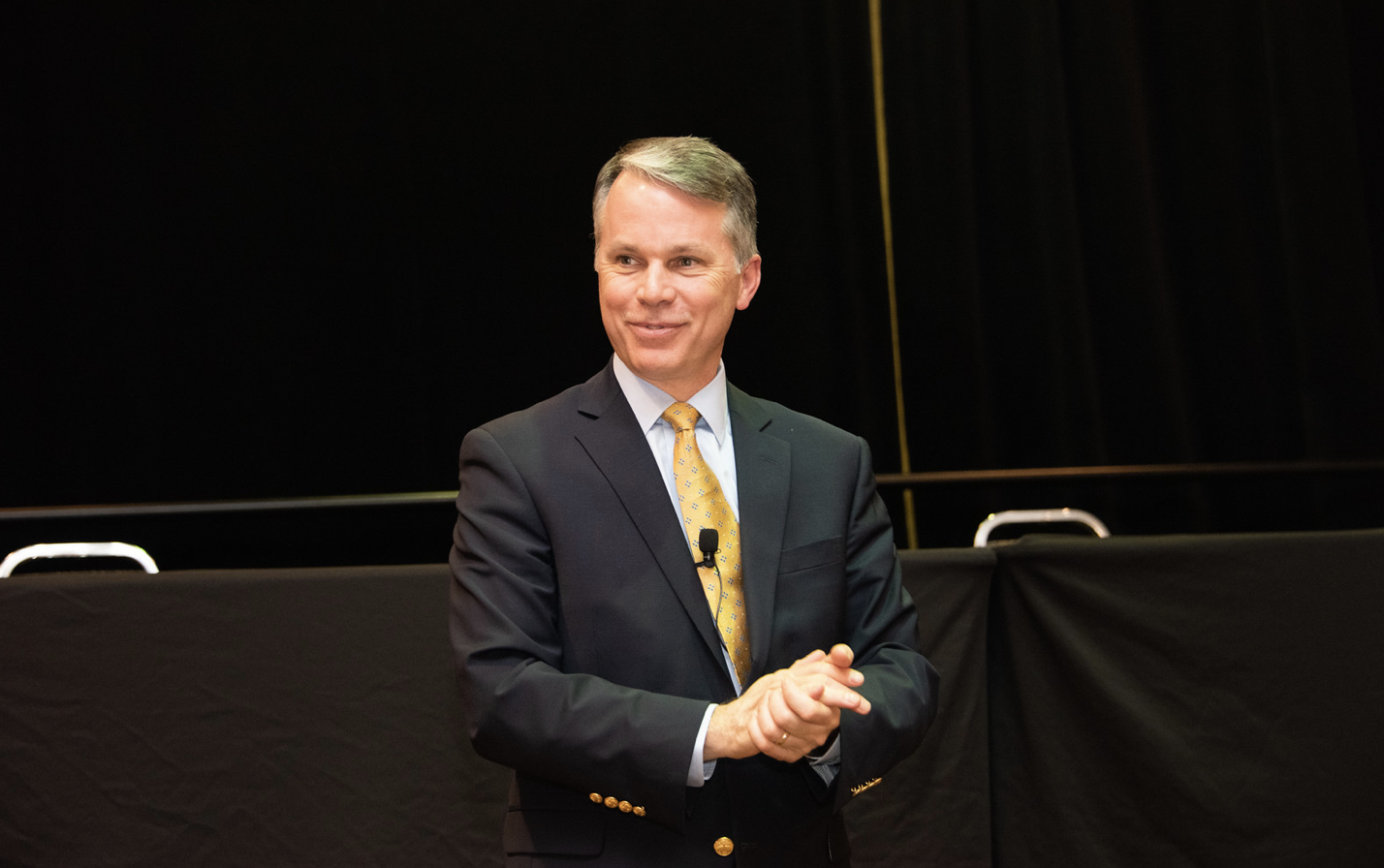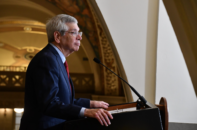JEFFERSON CITY, Mo. — For someone who readily admits he never imagined a career in transportation, it’s difficult to imagine Patrick McKenna doing anything else — and that’s not just because of his extensive commuting experience.
Finance has underscored McKenna’s career, long before he moved to Missouri to take over the Department of Transportation (MoDOT). He holds a degree in that field from what is now Bentley University in Massachusetts as well as a master’s in management and finance from the University of Maryland University College. He spent more than a dozen years in the U.S. Senate, eventually becoming its chief financial officer.
But over time, McKenna has married transportation and finance — first in New Hampshire and now in the Show Me State.
While McKenna’s career and family began in the nation’s capital, he and his wife wanted their children to have a similar upbringing as they did — which meant they needed to relocate from Arlington, Va.
“As what typically happens, you start thinking about something, and it just comes to you,” McKenna said. “We started talking about being in a smaller town, and two weeks later someone knocked on our door … and offered to buy our home. My wife is an attorney, so we signed a contract and looked at each other and said, ‘Now what?’”

For a time after selling the house, McKenna became quite the commuter. His family moved to another home in southwest Virginia, and he would travel there on the weekends from Washington, D.C. Then, they found a home in New Hampshire, and he commuted to and from the Granite State for three years before eventually joining his family.
He wouldn’t know it yet, but McKenna’s involvement in transportation as a career was just on the horizon.
McKenna eventually worked for a handful of nonprofits in New Hampshire and ran his own business. But then the opportunity came to join the New Hampshire Department of Transportation where he would manage a similarly sized budget as the U.S. Senate. He became its deputy commissioner.
McKenna and his wife joked they had “cheated retirement.” The McKenna family lived on the side of a mountain overlooking Lake Winnipesaukee. The town consisted of a handful of mountain peaks, about 40 islands, and a ski resort close enough to the McKennas they could cross country ski to it from their backdoor.
“It was a great place to raise our three children, but this opportunity [in Missouri] came up, and we just kind of looked at each other and said, ‘Well, we’re not retired yet, so let’s give it a shot.’”
McKenna moved to Missouri in late 2015 to take over MoDOT — including, of course, its finances. And while his oldest son finished high school, McKenna commuted between his old and new home, too.
“For me, it really blends the best of government and private sector, and we work a lot together because we actually plan and do the planning work and financial planning, but primarily most of the work that’s done on infrastructure is done by private companies. We work with industry, we work with private companies to get the best value for the taxpayers while we try to construct and reconstruct an aging infrastructure,” McKenna said. “It’s quite a challenge, and the financial issues are a very substantial challenge — not only here in Missouri, but all over the country.”
McKenna argued infrastructure is a policy area the average citizen might not have a full grasp on: “A lot of times the first thing people think of with transportation is they’re annoyed with it. So that’s tough when you’re trying to also seek the public’s support for investment in a very fundamental piece of what they need for their livelihoods and their life and enjoyment.”
But he’s trying to change that. Aside from using his financial prowess to tackle the department’s budget and substantially reduce its debt, McKenna has made not just transparency a pinnacle of the agency, but understanding.
MoDOT has compiled numerous graphs, charts, pamphlets, and explainers — available online or in hard copy — explaining funding needs, how money is spent, and prioritization of projects. There are maps showcasing incidents and construction for travelers and a calculator for individuals to assess his or her contribution to transportation funding. The first “Citizen’s Guide to Transportation Funding in Missouri” was published in 2016.
He wants the public, not just the department, to be aware of the resources MoDOT has and how its using them.

For example, McKenna explained the department manages bridges — which he considers to be the No. 1 issue MoDOT handles — not so much by the sheer volume but unit cost. In the past 20 years, the state has replaced about 1.2 million square feet of bridge deck; in the next 20, that figure will triple, McKenna predicts.
As for the budget, McKenna says MoDOT has been paying down its debt “aggressively,” which includes taking advantage of dips in the interest rate. Between 2000 and 2010, the department borrowed just under $4 billion. As of May, it has just $1.6 billion in outstanding principal.
“[P]eople expect efficient and limited government, and they expect us to do our job,” McKenna said. “I like high expectations, it keeps you on your toes, and it’s the way it ought to be: We should do the things that we are entrusted with by statutory or constitutional authority. We should do them well.”
When it comes to his actual marriage, McKenna has a government metaphor for that, as well. His wife, Suzanne, is an attorney with the Department of Natural Resources.
“We have a really great relationship — and have a good relationship with all the state agencies we work with. It’s the way government ought to run,” McKenna said. “Typically you can have pretty substantial issues between the Department of Transportation and an environmental department, but we work together to make sure we minimize the impact of the work we do on the environment, and it works well.”
McKenna has nothing but praise for how Gov. Mike Parson has made infrastructure and workforce development a priority while serving as Missouri’s chief executive — especially since he came into the job with virtually no transition period.
A focus on both issues, McKenna said, will spur economic development and future prosperity for the entire state — just further juxtaposing finance and transportation.

Kaitlyn Schallhorn was the editor in chief of The Missouri Times from 2020-2022. She joined the newspaper in early 2019 after working as a reporter for Fox News in New York City.
Throughout her career, Kaitlyn has covered political campaigns across the U.S., including the 2016 presidential election, and humanitarian aid efforts in Africa and the Middle East.
She is a native of Missouri who studied journalism at Winthrop University in South Carolina. She is also an alumna of the National Journalism Center in Washington, D.C.
Contact Kaitlyn at kaitlyn@themissouritimes.com.



















